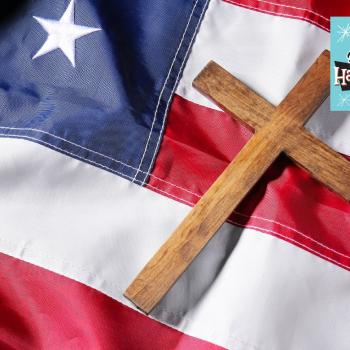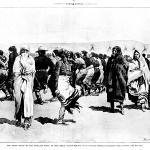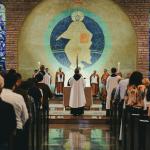My wife and I just started watching “The Handmaid’s Tale” on Hulu, and let me just tell you that if you haven’t seen it, it’s f*cking terrifying and uncomfortable to watch. However, in dire times like these, sometimes you have to do uncomfortable things to prepare yourself for the world that may be coming your way.
Let me also just say: thank God for people like Sheila Wray Gregoire, April Ajoy, and my partner in crime, Keith Giles, for the wonderful conversation we recently had on the Heretic Happy Hour podcast. In it, we delve into the pervasive influence the patriarchy has in contemporary society and the church. Our discussion uncovers the structural and cultural challenges that women face and calls for a reevaluation of Christian ethics in relation to gender equality. This article synthesizes the main points of their dialogue, highlighting the contradictions between patriarchal practices and the teachings of Jesus.
Struggles in the Church
Gregoire opens the discussion by talking about how women, despite typically being the primary caregivers and the ones ensuring their family’s participation in church activities, receive none of the praise for “leading” the family. The husbands do. These experiences underscore a broader societal pattern where men are often credited for women’s efforts, perpetuating a cycle of invisibility and undervaluation of women’s contributions.
This narrative exemplifies how patriarchal structures operate to maintain male dominance and female subordination, even in seemingly benign contexts such as church attendance. Sheila’s story is a microcosm of the broader issue of gender inequality, where women’s labor is often unrecognized and unrewarded.
Cultural Double Standards
April expands on Sheila’s points by discussing the cultural double standards that exist within the church. She highlights how events and activities are gendered in ways that reinforce traditional gender roles. For instance, men’s events at her church were lavishly funded and involved activities like car smashing and bacon-wrapped feasts, whereas women’s events were modest and focused on activities like decorating mason jars. This disparity not only reflects but also reinforces the societal devaluation of women’s interests and contributions.
April’s critique of these practices reveals the underlying message that men’s engagement is more valuable and worthy of investment. This mirrors the broader societal tendency to prioritize male interests and diminish the significance of women’s experiences and needs.
The Theological Injustice: The Jezebel Spirit
One of the most striking points in the discussion is the critique of the concept of the “Jezebel spirit.” Sheila and April both recount instances where women were blamed for sexual immorality and temptation, regardless of the context. Sheila notes that the term “Jezebel spirit” is used to vilify women and is not based on any coherent biblical exegesis. In fact, the Bible does not support the idea of a spirit associated with Jezebel, yet this concept is frequently used to control and shame women.
This theological misappropriation serves to uphold patriarchal power structures by making women the scapegoats for men’s moral failings. Sheila and April argue that this is a form of spiritual abuse that contradicts the inclusive and egalitarian teachings of Jesus. The use of such terms perpetuates a culture of blame and punishment directed at women, diverting attention from the accountability of men.
The Deconstruction Movement: A Response to Patriarchy
The conversation also touches on the broader deconstruction movement within Christianity, where individuals, particularly women, are re-evaluating their faith and its alignment with patriarchal values. April describes deconstruction as a painful yet necessary process of disentangling one’s beliefs from the oppressive structures that have been justified in the name of religion. This movement is often met with resistance from those who benefit from the status quo, highlighting the deep-seated nature of patriarchal norms.
A Call for True Christian Ethics
The dialogue between us culminates in a call for a reformation of Christian ethics that truly reflects the teachings of Jesus. We argue that the church–if it is going to be anything at all–must move beyond patriarchal interpretations of scripture and embrace a theology that affirms the dignity and equality of all people. This involves recognizing and rectifying the ways in which women have been marginalized and oppressed within religious communities.
Keith emphasizes that the patriarchal structures in the church are antithetical to the teachings of Jesus, who consistently uplifted and empowered women. He points out that the early Christian communities were marked by a radical egalitarianism that has been lost in many contemporary church practices. Restoring this vision requires a commitment to justice, equity, and the dismantling of patriarchal norms.
Conclusion: Aligning Practice with Faith
We hope and believe that the conversation on this episode of Heretic Happy Hour is a powerful reminder of the work that still needs to be done to achieve gender equality within the church and society. We challenge patriarchal men to reconsider how their actions and beliefs align with the teachings of Jesus, and demand a commitment to justice and the empowerment of all individuals, regardless of gender.
As the church grapples with these issues, it must remember that the fight for women’s empowerment is not merely a social or political cause but a deeply theological one. It is about living out the radical inclusivity and love that Jesus exemplified. Only by confronting and dismantling patriarchal structures can the church truly embody the values it professes to uphold.
Check out the Heretic Happy Hour podcast wherever you listen to podcasts: Spotify, iTunes.
Also, if you’ve been digging my work on here, and want to see me be able to continue writing as close to full-time as humanly possible, please take a look at my Patreon page at www.patreon.com/mjdistefano. Even $1 a month helps bigly!




















